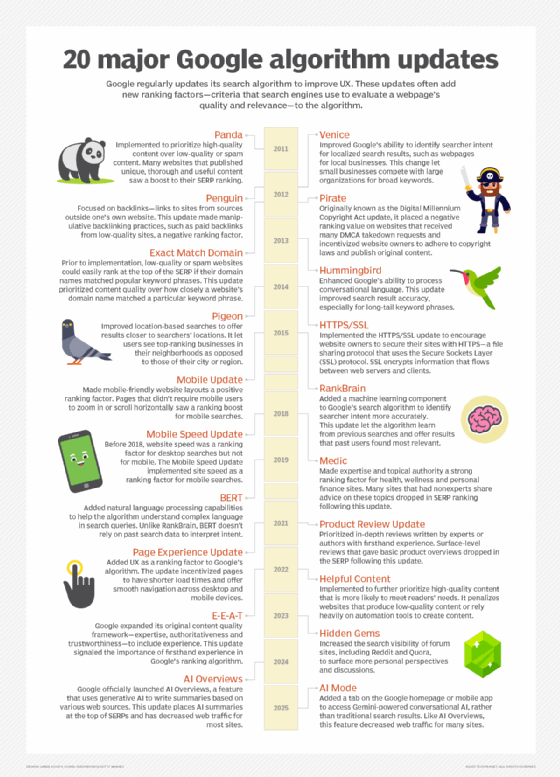A history of Google algorithm updates
Google frequently updates its algorithm to improve search result quality. These updates often enhance search query interpretation and prevent spam tactics.

As Google continuously changes its search algorithm, content marketers should be on their toes.
Google's search function filters through billions of webpages across the internet to find the best content to meet users' needs. To accurately interpret user queries and retrieve optimal results, Google relies on a complex set of rules known as an algorithm. Digital marketers and other content creators can use search engine optimization (SEO) strategies to understand Google's algorithm and create content around it to rank highly on the search engine results page (SERP) for target keywords.
An SEO strategy requires continuous reevaluation because Google changes its algorithm multiple times each year. Google reportedly made eight changes to its search engine in 2024 alone. Although some Google algorithm changes may be too small for content marketing teams to notice, others can dramatically affect SERP rankings.
Major algorithm updates from the past decade include Panda, Pirate, Hummingbird, RankBrain, Hidden Gems, AI Overviews and AI Mode.
Why does Google update its search algorithm?
Google typically implements an algorithm update to improve its search function with different technologies or processes.
For instance, Google added Bidirectional Encoder Representations from Transformers (BERT) -- a deep learning tool -- to its algorithm in 2019 to improve its ability to understand conversational language. The BERT update offered users more relevant search results by more accurately interpreting searcher intent -- the purpose of a user's search query -- in lengthy and complex keyword phrases.
Google often updates its algorithm to address aspects that people can manipulate. Before 2012, if a webpage's domain name exactly matched a particular keyword, that page could rank high on the SERP for that search term, even if its content was unhelpful to users. Spammers figured this out and filled domain names that matched popular search terms with low-quality content to generate web traffic. Then, in 2012, Google implemented the Exact Match Domain update to reduce the degree to which a site's domain name improved its SERP ranking.
Like any organization, Google wants its product to offer positive UX. So, it continuously updates its algorithm to meet user needs. Digital marketers and SEO strategists should expect the pattern of Google's algorithm changes to continue and stay on top of future updates.
Google embraces generative AI for search
In May 2024, Google rolled out AI Overviews -- a feature that combined the company's traditional search algorithm with a customized version of its generative AI tool, Gemini. The feature synthesizes information in top-ranking webpages into concise summaries for users. The summaries appear at the top of the SERP and offer immediate answers to users' queries.
AI Overviews doesn't eliminate the traditional SERP but appears above it. If users don't trust the AI Overviews, they can scroll past it to see the traditional results. Additionally, the AI Overviews section itself highlights a few source webpages that users can click on to learn more.
Then, in May 2025, Google added AI Mode -- a tab that users can select on the Google homepage or mobile app to access Gemini-powered conversational AI, rather than traditional search results. Unlike AI Overviews, which are now part of the standard search experience, AI Mode moves away from the traditional SERP and has a fully conversational interface, like that of ChatGPT or Perplexity.
Both AI Overviews and AI Mode reflect a major shift in how people search for information. People want immediate answers rather than a list of websites they must manually browse, so these updates improve the search experience for many users. However, they also pose challenges for organizations that rely on organic web traffic, such as content marketers, publishers and e-commerce businesses.
Editor's note: The article was updated to reflect changes in Google's search algorithm.
Tim Murphy is site editor for Informa TechTarget's SearchCustomerExperience and SearchContentManagement sites.